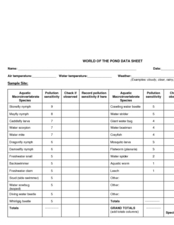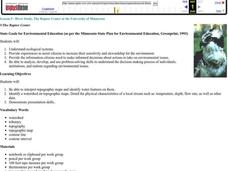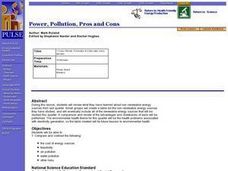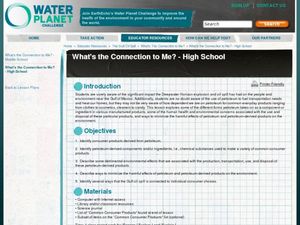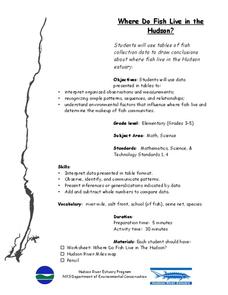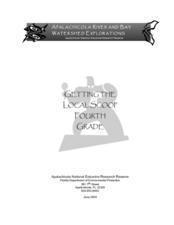Curated OER
What are Properties of Wood?
Students use hands on scientific observation to determine characteristics of wood. They work directly with the materials and record their observations. Students test if wood absorbs water, if wood floats or sinks, and if all wood...
Curated OER
Match the Hatch
Students learn how to flyfish and learn that flyfishing plays an important role in protecting, and restoring coldwater fisheries. In this flyfishing lesson plan, students learn the art of flyfishing and learn about the natural feeding...
Curated OER
World of the Pond Data Sheet
In this pond worksheet, students study aspects associated with pond water and pond life. Students complete 26 fill in the blank questions to complete the data chart of observations.
Curated OER
Martha Who?
Young scholars explore how the number and types of organisms an ecosystem can support depends on the resources available and on abiotic factors, such as quantities of light and water, a range of temperatures, soil composition. They are...
Curated OER
Pond Words
In this pond learning exercise, 3rd graders study words associated with pond water and pond life. Students complete 7 fill in the blank questions using the given words and their definitions at the top of the page.
Curated OER
Take a Dip: The Water in Our Lives
Students explore the function of storm drains and the importance of keeping them clean of debris. They obtain permission from local authorities and perform community service painting stenciled messages near existing storm drains.
Curated OER
World of the Pond Word Search
In this pond environment worksheet, 6th graders search for 24 words in the word search puzzle. Each word is about pond life and includes science vocabulary words.
Curated OER
Conservation in Small Spaces: Conservation
Students define conservation, identify actions that conserve habitat and those that reduce habitat, and generate ideas about how one can practice conservation in everyday life.
Curated OER
Identifying Wetlands
Students describe three major categories of indicators that are used to delineate wetlands. In this wetlands lesson students visit a wetland and make observations then complete an activity using the soil.
Curated OER
River Study
Students explore a stream in their area and show the class the topographic map of the stream. They locate the topographic map and name the streams, lakes and ponds in their watershed. They write a paragraph about their stream and...
Curated OER
Wetland Wonders
Young scholars describe the characteristics of wetlands. They demonstrate their understanding of the importance of wetlands to humans and wildlife and determine they are defined by the presence of water, and specialized soils.
Curated OER
Environment: Mock Trial
Learners role-play a trial regarding the taking of family property for a new water purification plant. Among the roles are the judge, attorneys, witnesses, plaintiff, mayor, and jury members. Once both sides present their case, the...
Curated OER
Power, Pollution, Pros and Cons
Students review what they know about non-renewable energy, compare and contrast advantages and drawbacks of each type, such as cost of energy sources, feasibility, air pollution, water pollution, and other risks, and create table listing...
Curated OER
Sodium Bentonite Swelling Index
Students research the effects of sodium bentonite being combined with water. They discuss the reasons why this chemical is used in landfills. They measure the swelling index of sodium bentonite clay.
Curated OER
African Elephant Overpopulation Problem
Students investigate the problem of elephant overpopulation. They identify the components of the watering hole as found in Addo Elephant National Park. They also pretend to be part of the environment and act out the part in a class drama...
Curated OER
Environment
Fifth graders receive a general overview of the world's environmental dilemmas thereby understanding the global implications of their actions. They examine their connection to the ecosystem by looking at the influence of the environment...
Curated OER
What's the Connection to Me?
Students discuss the impact of oil spill to the environment and to their daily lives. In this environmental science lesson plan, students research the pros and cons of petroleum based products. They share their findings in class.
Curated OER
Where Do Fish Live in the Hudson?
Students explore the environmental factors that influence where fish live and determine the makeup of fish communities in the Hudson. They interpret guided observations and measurements to assess patterns, sequences and relationships.
Curated OER
Language Arts: How Can Research Shape Ideas?
Students are able to characterize arsenic and determine its potential health threats in writing. They are able to compare and contrast arsenic to other water pollutants using Venn diagrams. Students are able to demonstrate essay skills...
Curated OER
Landscape Garden Makeover
A project-based learning plan focuses on landscapes in the community. After identifying problems, such as dead trees or misplaced automatic sprinklers, learners design solutions, contact local organizations to fix the problems, and do...
Curated OER
Getting the Local Scoop
Fourth graders practice interviewing professionals in their area about their careers at a local watershed. They identify at least three careers that depend on the watershed and discuss its history. They write a composition to end the...
Captain Planet Foundation
Rotting Away
What happens at the end of a plant's life cycle? Show kids the natural way that plants show that they're decomposing, as well as the importance of compost, with a lesson about living organisms. After reading Log Cabin by Anne Schreiber,...
Captain Planet Foundation
Square Foot Fall Garden
First graders learn the basic needs of plants and identify geometric shapes while planting a fall garden. Combining math and science in one instructional activity, the resource guides kids through starting their class garden as they...


